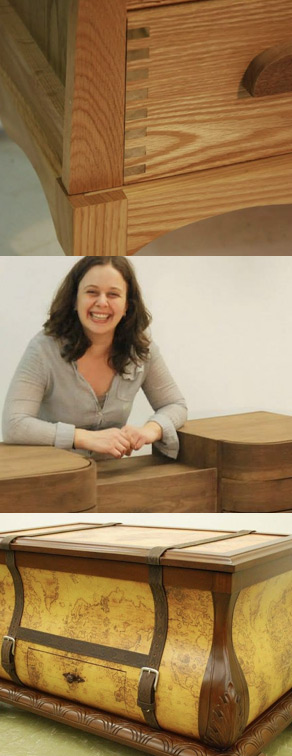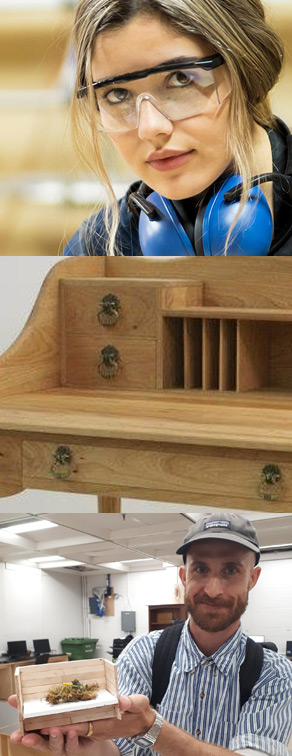About
At Rosemount Technology Centre, students in Cabinetmaking learn the fundamentals of cabinetmaking materials, machines & safety as well as specialized techniques like veneering and carving.
Hands-on project work is the heart of the program. Our teaching staff comes from different industry backgrounds, from custom cabinetry, furniture design, repair and restoration, film sets, and aerospace.
Our graduates work in big and small shops; build kitchens, office furniture, commercial interiors; they outfit private jets, restore antiques, design furniture and teach others.
Here are some of the things you will learn:


The Cabinetmaking program leading to a DVS is a 1650 hour course.
Day program (6 hrs/day): approximately 14.5 months.
Evening program (5 hrs/evening): approximately 17 months.
This program is taught mainly from two campuses:
Our Cabinet Making program will start at our John F. Kennedy Adult Education campus located at 3030 Rue Villeray, Montréal, QC H2A 1E7 and transition halfway, to our Rosemount Technology Centre or main campus located on 3737 Rue Beaubien E, Montréal, QC H1X 1H2.
| Program Competencies | Hours | Credits | |
|---|---|---|---|
| 1 | Determine their suitability for the trade and the training process Introduction to the program. Self-directed work site visits. |
30 | 2 |
| 2 | Interpret drawings |
75 | 5 |
| 3 | Take measurements and do calculations required for manufacturing |
30 | 2 |
| 4 | Make an object using hand tools |
75 | 5 |
| 5 | Prepare the parts for a piece of furniture to be manufactured |
120 | 8 |
| 6 | Assemble furniture |
120 | 8 |
| 7 | Make patterns, templates, jigs and fixtures |
30 | 2 |
| 8 | Analyze the impact of finishing processes on manufacturing |
60 | 4 |
| 9 | Make technical drawings |
75 | 5 |
| 10 | Make a straight piece of furniture out of solid wood |
90 | 6 |
| 11 | Veneer and laminate materials |
30 | 2 |
| 12 | Make panel furniture |
90 | 6 |
| 13 | Plan the manufacturing of a product |
30 | 2 |
| 14 | Manufacture commercial, industrial or institutional furniture |
120 | 8 |
| 15 | Manufacture and install modular kitchen components |
105 | 7 |
| 16 | Explore traditional and innovative techniques |
120 | 8 |
| 17 | Make curved furniture |
120 | 8 |
| 18 | Manufacture and install architectural products |
120 | 8 |
| 19 | Help develop a product |
60 | 4 |
| 20 | Provide technical support for a manufacturing project |
60 | 4 |
| 21 | Enter the workforce Training in hand application and spraying of stains and clear finishes. |
90 | 6 |
| Total |
1650 | 110 |
Architectural millwork cabinetmaker
Custom kitchen cabinetmaker
Aircraft furnishings cabinetmaker
Custom furniture and fine craft production
Repair and restoration
To be eligible for admission to this program, candidates must meet one of the following requirements:
Persons holding a Secondary School Diploma or its recognized equivalent, for example, an Attestation of Equivalence of Secondary V studies, or a postsecondary diploma such as the Diploma of College Studies or a Bachelor's degree
OR
Persons who are at least 16 years of age on September 30 of the school year in which their training is to begin and have earned the Secondary IV credits in language of instruction, second language and mathematics in the programs of study established by the Minister, or have been granted recognition for equivalent learning
OR
Persons who are at least 18 years of age upon entry into the program and have the following functional prerequisites: the successful completion of the General Development Test (see the following table), or recognition of equivalent learning
OR
Persons who have obtained Secondary III credits in language of instruction, second language and mathematics in programs established by the Minister are required to pursue general education courses, concurrently with their vocational training, in order to obtain the Secondary IV credits they lack in language of instruction, second language and mathematics in programs established by the Minister.
This section identifies the modules or course codes for the actual programs of study in adult general education that are specific prerequisites in language of instruction and mathematics. Functional prerequisites includes the successful completion of specific prerequisites as well as the general development test (TDG). When a DVS doesn't require specific prerequisites in language of instruction or in mathematics, a dash ( - ) is displayed in the appropriate cell. For programs that lead to an AVS, specific prerequisites and the TDG do not apply (N/A).
| Language of instruction | |||
|---|---|---|---|
| Adults ENG-3103-3 ou (ENG-3071-3) |
|||
| Youth 632-406 ou (630-416) |
|||
Mathematics |
|||
| Adults MTH-3053-2 ou (MTH-3016-2) |
|||
| Youth 563-306 ou (568-314) |
Send an email to aevsinternational@emsb.qc.ca with the following information:
Begin the following steps to insure a complete student dossier
ROSEMOUNT TECHNOLOGY CENTRE
Copyright ©2005-2025 Rosemount Technology Centre. All Right Reserved.